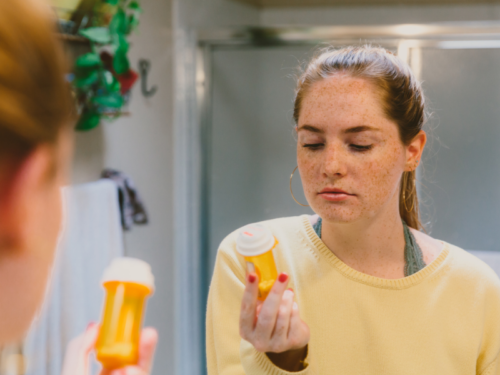
Table of Contents
Antidepressants and Suicidal Thoughts: What You Should Know

Written By: Ashley Laderer

Clinically Reviewed By: Dr. Eli Muhrer
October 11, 2024
7 min.
If you’re about to start taking an antidepressant, you may have heard about the increased risk for suicidality. Here’s what you need to know about the link between antidepressants and suicide –– and what to do about it.
Learn more about our Clinical Review Process
Table of Contents
Trigger warning: Suicide. If you’re experiencing suicidal thoughts or are in danger of harming yourself, this is a mental health emergency. Contact The Suicide & Crisis Lifeline 24/7 by calling or texting 988.
Antidepressants are widely prescribed, helping millions of people who struggle with depression (clinically known as major depressive disorder) and other mental health conditions. However, despite their proven effectiveness for many, antidepressant medications don’t come without risk. Antidepressants have a “black box warning” issued by the FDA. The warning indicates the possible rare yet serious risk of suicidal thinking and behavior –– especially in children, teenagers, and young adults.
Suicidality should always be taken seriously. According to the American Foundation for Suicide Prevention, suicide is the 11th highest cause of death in the United States. Not to mention, some populations, such as adolescents, have experienced increased suicide rates. For marginalized populations, like LGBTQIA+ youth, suicide risk is even higher. One in ten LGBTQIA+ youth attempted suicide in the past year, and 39% seriously considered carrying out a suicide attempt, data shows. Read on to learn about why antidepressants may cause suicidal thoughts, what the research says, how to mitigate the risk, alternative treatment options for depression, and more.

We offer virtual, intensive treatment and medication management
Charlie Health is a supportive program for overcoming suicidality.
Why antidepressants may cause suicidal thoughts
Although we typically associate antidepressants with their depression-relieving properties, it is possible for them to increase suicidal thoughts. Types of antidepressants that may cause this include:
- Selective serotonin reuptake inhibitors (SSRIs)
- Serotonin and norepinephrine reuptake inhibitors (SNRIs)
- Tricyclic antidepressants (TCAs)
- Monoamine oxidase inhibitors (MAOIs)
- Atypical antidepressants
“While antidepressants are generally effective at improving mood over time, they can initially increase energy levels before a person’s mood improves,” says Dr. Eli Muhrer, M.D., a board-certified Child and Adolescent Psychiatrist with Charlie Health. “In those experiencing depression with suicidal thoughts, this temporary increase in energy without an improvement in mood can sometimes intensify those suicidal thoughts.”
Additionally, there may be some increased anxiety or agitation when you first start taking an antidepressant medication, which could amplify distressing thoughts, Dr. Muhrer says. In some cases, antidepressants may also worsen depression symptoms, leading to new or worsening suicidal thoughts and potentially suicidal behavior.
So, why do antidepressants cause suicidal thoughts from a scientific standpoint? “From a biological perspective, antidepressants increase neurotransmitter activity in the brain, particularly serotonin. The initial boost in serotonin may cause mood instability in some individuals before therapeutic effects take hold, possibly contributing to suicidal thoughts,” Dr. Muhrer says.
All of this being said, research is mixed. While some studies have shown a link between antidepressant use and increased risk of suicidality, others don’t. This conflicting evidence makes it difficult to draw broad conclusions. Additionally, many researchers and mental healthcare providers argue that antidepressants reduce suicidality and death by suicide risk, especially in the long run.
Another scenario to consider is antidepressant discontinuation syndrome or antidepressant withdrawal, which occurs when you stop taking your antidepressant, especially if you stop abruptly without following your doctor’s instructions for weaning off the medication. This can result in uncomfortable physical withdrawal symptoms along with suicidal ideation or behavior.

How common are suicidal thoughts caused by antidepressants?
“Suicidal thoughts while on antidepressants are rare but concerning, occurring in approximately 1% to 4% of patients under the age of 24,” says Dr. Muhrer. Put another way, you are far more likely to experience common side effects when first taking an antidepressant, such as drowsiness or upset stomach than you are to experience suicidal thoughts. “Most patients will not experience this side effect, but it’s crucial to monitor for any changes in behavior, especially during the first few weeks of treatment,” Dr. Muhrer added.
The risk is highest at the beginning of treatment or when medication dosages are increasing. During this time, your psychiatrist will check in with you at follow-up appointments to see how you’re doing and monitor for warning signs of suicidal behavior. It’s important to always be honest with your doctor if you are experiencing suicidal thinking or contemplating planning a suicide attempt.
Risk factors for developing suicidal thoughts while on antidepressant medication
Certain people are at higher risk of experiencing this side effect with antidepressant use. The risk is especially high for people ages 24 and younger. Dr. Muhrer says other risk factors include:
- If you have attempted suicide in the past
- Having a family history of suicide
- Having co-occurring mental health conditions
- Rapid or large increases in medication dosage
If you fall under any of these categories, it’s important to have a serious conversation with your doctor about the suicidality risk and to create a safety plan so you’re prepared in case you do experience suicidal thinking, especially when you first start taking an antidepressant or are increasing the dosage.
Managing the risk of suicidal ideation
Just because there is this potential risk, it doesn’t mean you should necessarily shy away from taking an antidepressant medication. “It’s important to remember that while the risk exists, the overall benefits of treating depression with antidepressants generally outweigh the risks for most individuals,” Dr. Muher says.
So, if you (or your child) have just started taking an antidepressant, it’s important to be aware of this risk and be on the lookout for any warning signs. It’s also important to understand the difference between passive suicidal ideation and active suicidal ideation. The former involves suicidal thoughts without the intent to actually attempt suicide. You have no plan in place to die by suicide. The latter, though, is when you have suicidal thoughts along with at least some intent and plan to attempt suicide.
Some warning signs of suicidal ideation include:
- Being preoccupied with death
- Wanting relief from your symptoms and emotional pain
- Feeling like you’re not worthy of help
- Feeling like a burden to loved ones
- Wishing you were never born
- Thinking your loved ones would be better off without you
If you’re experiencing active suicidal ideation, it’s crucial to seek help immediately for your own safety and well-being. You can call or text the 988 Suicide & Crisis Lifeline to talk to a trained counselor, 24/7, 365 days a year.
In scenarios where your child or teen is the one taking antidepressants, be on the lookout for warning signs that they may be suicidal, especially when they first start taking the medication. Here are some red flags to look out for:
- Talking about wanting to disappear or die
- Talking about suicide
- Isolating or withdrawing from loved ones
- Engaging in reckless behavior
- Writing about or making art about death
- Giving their belongings away
- Major changes to appetite or sleep
- Exhibiting unusual anger or hostility
- Using drugs or alcohol
If your child is exhibiting any of these signs, contact their psychiatrist ASAP. If you think they are in imminent danger, don’t hesitate to call 988 or bring them to the nearest emergency room. Taking immediate action for suicide prevention is key.
Alternative treatment options for depression
Antidepressant treatment isn’t the only option for relieving depression. There are non-pharmaceutical options, too. Psychotherapy, also known as talk therapy, is a great option for depression treatment. Types of therapy that are helpful for treating depression are as follows:
Cognitive behavioral therapy (CBT)
CBT is a very commonly used therapy modality that focuses on how your thoughts, feelings, and behaviors influence each other. You will identify unhealthy, unhelpful ways of thinking (AKA cognitive distortions) that may contribute to your depressive symptoms and challenge these thoughts to create healthier ways of thinking and behaviors.
Motivational interviewing
Motivational interviewing is a unique type of therapy that empowers you to find your own reasons and motivations for improving your mental health. You’ll learn to identify negative thoughts and feelings while developing healthier ones as you take steps toward achieving your goals.
Psychodynamic therapy
Psychodynamic therapy allows you to look back at your past and determine the root causes of your struggles. The foundation of this therapy is that your past experiences and subconscious thoughts play a major role in your present-day emotions and relationships.
Dialectical behavior therapy (DBT)
DBT is a skills-based therapy that will teach you how to regulate difficult emotions and tolerate distress, which can be especially helpful for severe depression. Other skills include interpersonal relationships, mindfulness, and self-compassion.
On top of therapy and antidepressant use, research shows that lifestyle modifications can have an impact on improving depressive symptoms and well-being in general, including:
- Having good sleep hygiene and getting a healthy amount of sleep
- Exercising regularly, especially aerobic/cardio exercise
- Spending time in nature and getting enough sunlight
- Having good social support and adequate social interactions
- Eating a balanced

How Charlie Health can help
If you or a loved one are struggling with depression and could benefit from therapy and medication management, Charlie Health is here to help. Charlie Health’s virtual Intensive Outpatient Program (IOP) provides more than once-weekly mental health treatment for individuals and families dealing with complex mental health conditions, including major depressive disorder.
Our expert clinicians incorporate evidence-based therapies into individual counseling, family therapy, and group sessions. We also offer medication management to clients as needed. If a psychiatrist prescribes you an antidepressant, you will be closely monitored for suicidality and suicidal behavior. Your care team will ensure that you’re as safe as possible during treatment to mitigate suicide risk. Feeling relief from depression is possible. Fill out the form below or give us a call to start healing today.
References
https://afsp.org/suicide-statistics/
https://www.thetrevorproject.org/survey-2024/
https://www.cdc.gov/mmwr/volumes/73/su/su7304a9.htm
https://pmc.ncbi.nlm.nih.gov/articles/PMC6493906/#ss6
https://pmc.ncbi.nlm.nih.gov/articles/PMC3353604/
https://www.nature.com/articles/s41386-021-01179-z
https://my.clevelandclinic.org/health/diseases/25218-antidepressant-discontinuation-syndrome




